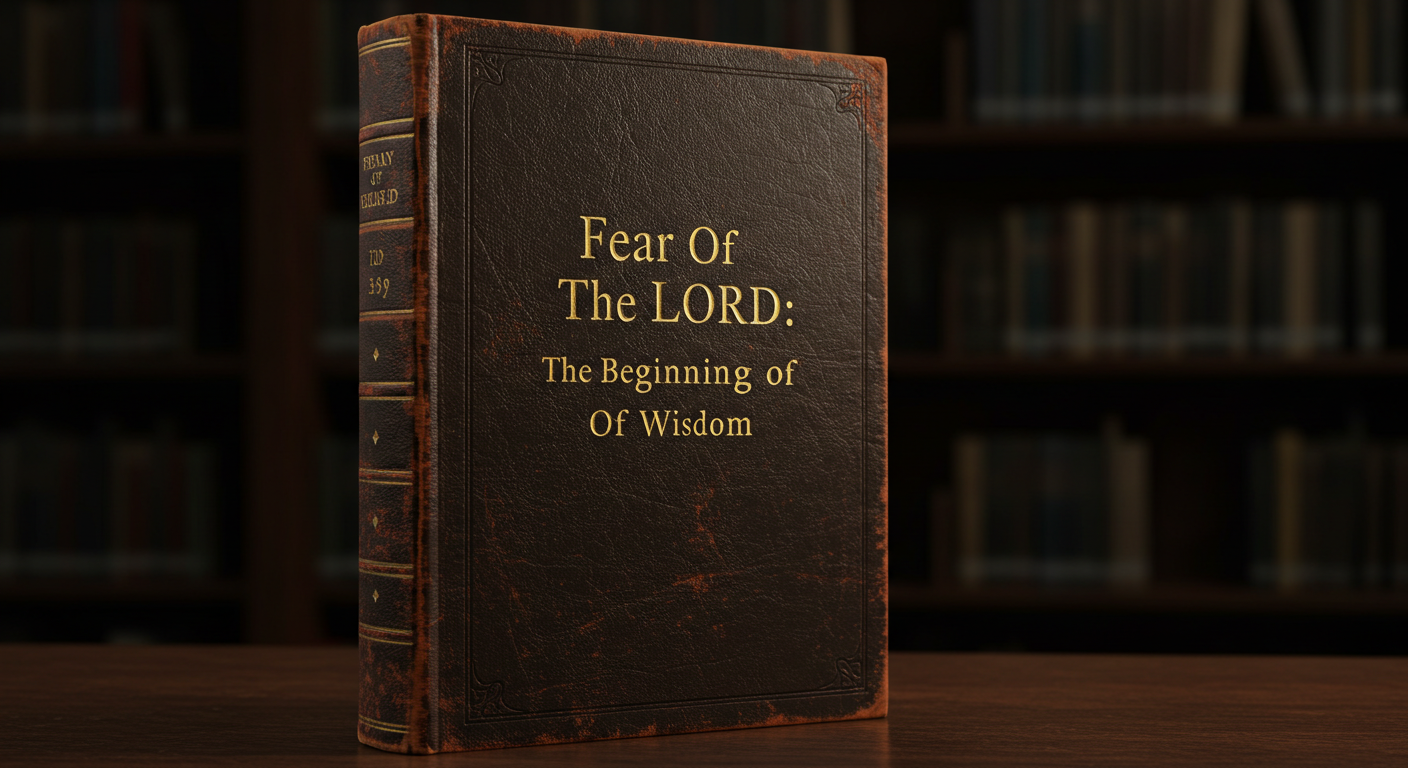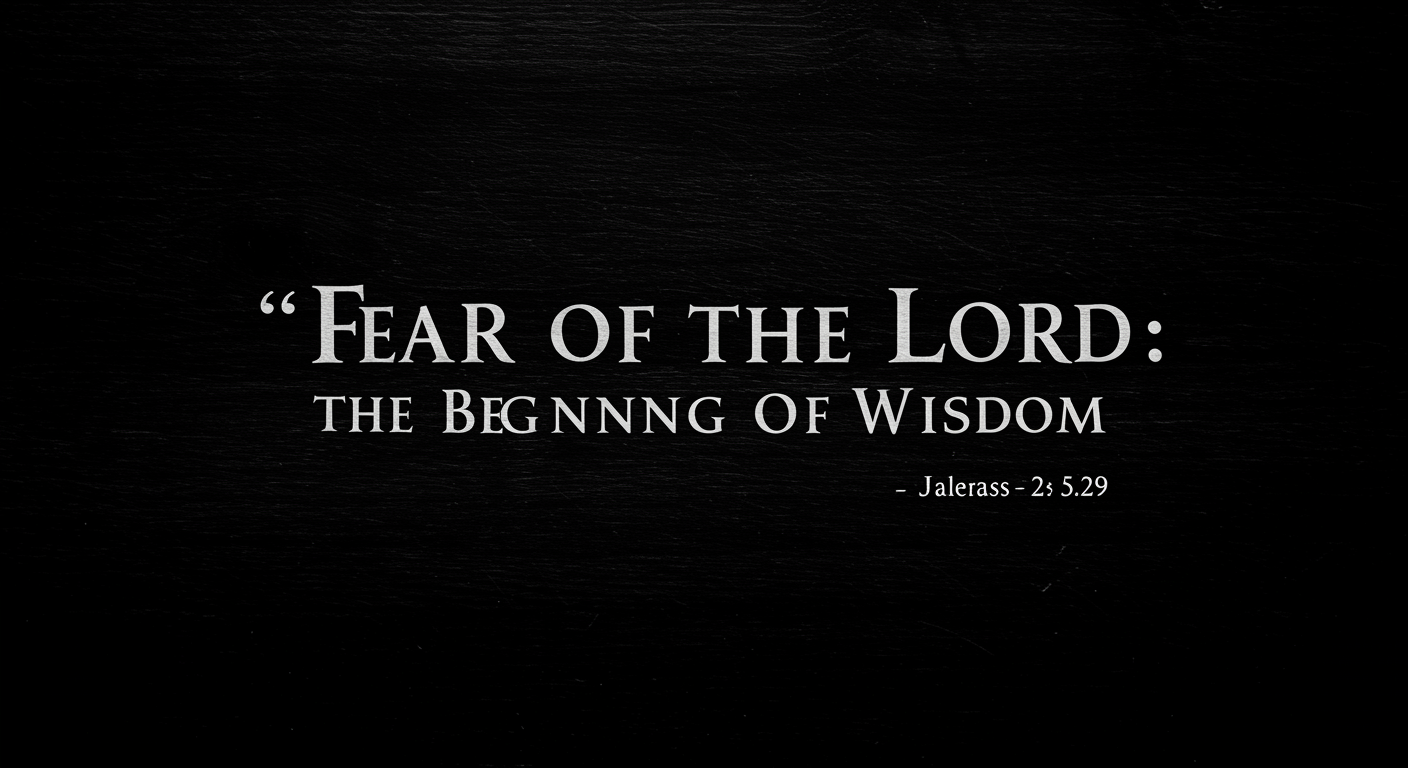Explore the profound link between reverence for the Lord and wisdom in this insightful post. Discover how ancient scriptures guide modern life with spiritual depth.
Fear Of The Lord: Beginning Of Wisdom – Proverbs 9:10; Ecclesiastes 12:13

Introduction
Understanding the fear of the Lord is like finding the half-hidden map to wisdom’s greatest treasures. It’s the beginning, the cornerstone that supports an entire lifetime of learning and spiritual growth. As you navigate through this divine journey, two significant verses come to mind: Proverbs 9:10 and Ecclesiastes 12:13. These scriptures encapsulate the essence of wisdom as tethered directly to a profound respect and reverence for the Lord. These passages invite you to explore what it genuinely means to live wisely and morally in this world.
The Character of the Fear of the Lord
When you think of the fear of the Lord, imagine reverence that isn’t just motivated by trepidation but is intertwined with awe, respect, and a deep love. Proverbs 9:10 introduces this concept by declaring that the “fear of the Lord is the beginning of wisdom.” But what does this fear ask of you? It’s not about living in dread but rather humbly acknowledging the grandeur and holiness of God, thus directing your life accordingly.
An example of a biblical character embodying this trait is Moses. His story is filled with instances where his reverence and obedience shape the course of Israel’s history and offer a template you can reflect on.
Moses in the Bible
Their Story in the Bible
Moses’ story begins with his miraculous survival as an infant, found floating in a basket on the Nile by Pharaoh’s daughter (Exodus 2:1-10). As he grows, he is divinely assigned the task of liberating his people. Through a combination of obedience and listening to divine instruction, Moses leads the Israelites out of Egyptian bondage. His accomplishments, bolstered by his fear of the Lord, include parting the Red Sea (Exodus 14:21-22) and receiving the Ten Commandments (Exodus 34:27-28).
Despite many challenges, Moses remained steadfast, dedicating himself as a servant of God. Even in his personal struggles, such as his frustration with the Israelites’ complaints and his missing the Promised Land due to disobedience (Numbers 20:12), his life’s work is largely characterized by alignment with God’s commands. This unwavering dedication stemmed from a deep-seated reverence—an awe that propelled him to act beyond himself for a greater cause.
Lessons from Their Life
Moses’ life brims with illustrative lessons. Firstly, it reminds you that reverence for the Lord transcends fear—it becomes a channel for extraordinary acts and leadership. His journey exemplifies strength not just in physical deeds but in steadfast faith and obedience. Additionally, you learn that perfection isn’t a prerequisite for being close to God, rather a reverent heart willing to align with divine will is vital.
His story also emphasizes the importance of humility and patience, encouraging you to trust God’s timing and methods. The narrative of Moses underscores how one’s genuine fear of the Lord results in a life well-lived through obedience and reverence.
Connection to Today’s World
In contemporary society, wisdom is often interchangeable with intelligence or worldly success. However, the biblical perspective offers a holistic approach that integrates the spiritual dimension. Daily life presents challenges—whether at home, work, or within broader societal issues. Engaging with Moses’s story could grant you perspective, illustrating how the reverence of God can lead to wisdom that transcends mere intellectual knowledge and taps into a deeper, divine reservoir.
For instance, Moses’ patience and leadership warn against the impatience and self-centeredness pervading today’s world. This connection between ancient narratives and modern dilemmas challenges you to reflect: How does your reverence for God shape your decisions in today’s fast-paced, success-oriented environment?

Key Bible Verse
“Fear God and keep his commandments, for this is the duty of all mankind.” – Ecclesiastes 12:13. This verse underscores the ultimate calling for humanity. It reminds you that amid life’s complexities, the fundamental task is not only appeasing self-interests but living in a manner that honors God through obedience and sustained reverence.
Thought-Provoking Question
As you reflect on these divine insights, consider this: Are your actions guided by a sincere fear of the Lord, and does that reverence shape how you pursue wisdom, even when faced with personal sacrifices and difficult choices?
Historical/Cultural Context
Exploring the biblical stories within their historical and cultural milieu offers a clearer picture of their lessons. In Moses’ time, reverence for the divine wasn’t just a personal affair but a community endeavor, woven into the fabric of Israelite identity. This collective understanding of fearing the Lord as a unifying wisdom source speaks volumes about the importance of shared faith and responsibility toward each other and God.
Comparison with Other Characters
Consider David, another figure who fears the Lord profoundly. Both Moses and David illustrate lives punctuated by intense devotion and monumental failures that shaped their legacies. While Moses’ understanding of God emerges through direct revelation and guidance, David’s is characterized by personal turmoil and repentance. Comparing their narratives enriches your understanding of how the fear of the Lord can manifest diversely yet powerfully across different lives.
Prayer
In your own pursuit of wisdom, may you echo a prayerful heart like Moses: “Lord, guide my actions with humility and reverence. Let my fear of You be the foundation of wisdom, shaping me to walk righteously and lovingly fulfill Your commandments.”
For further meditation, consider revisiting Proverbs 9:10 and Ecclesiastes 12:13 as touchstones on your spiritual journey.







